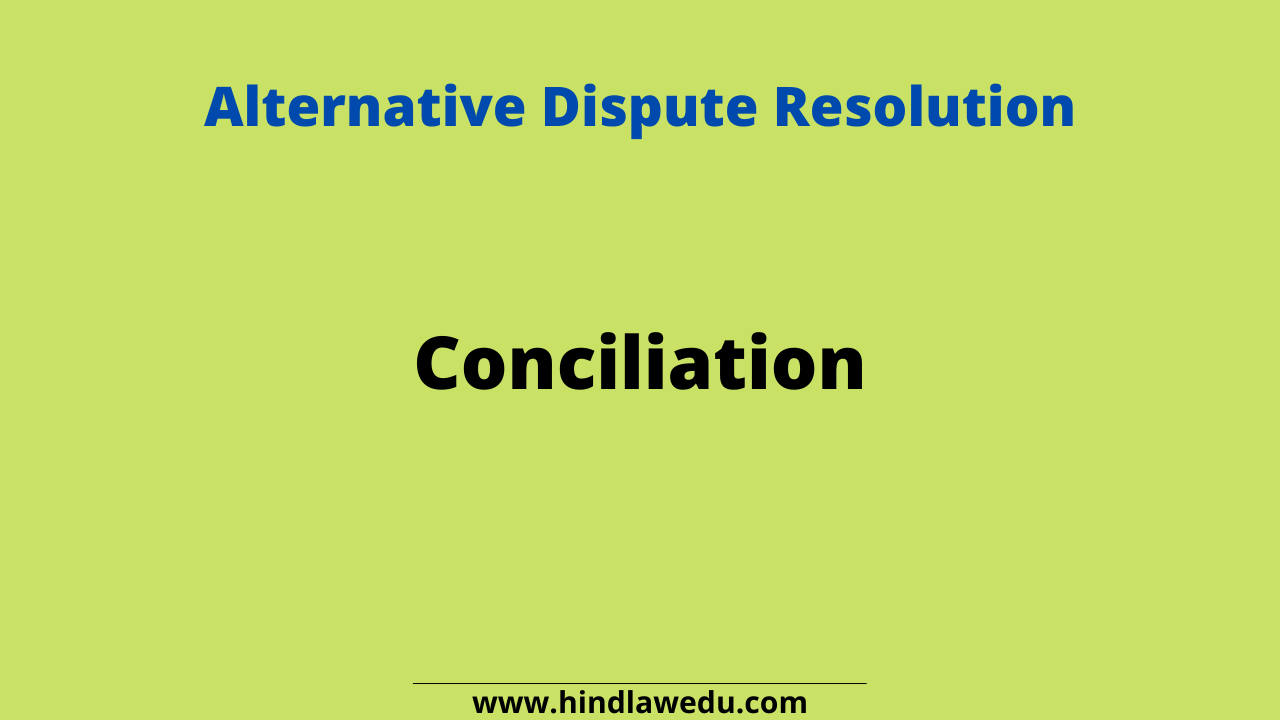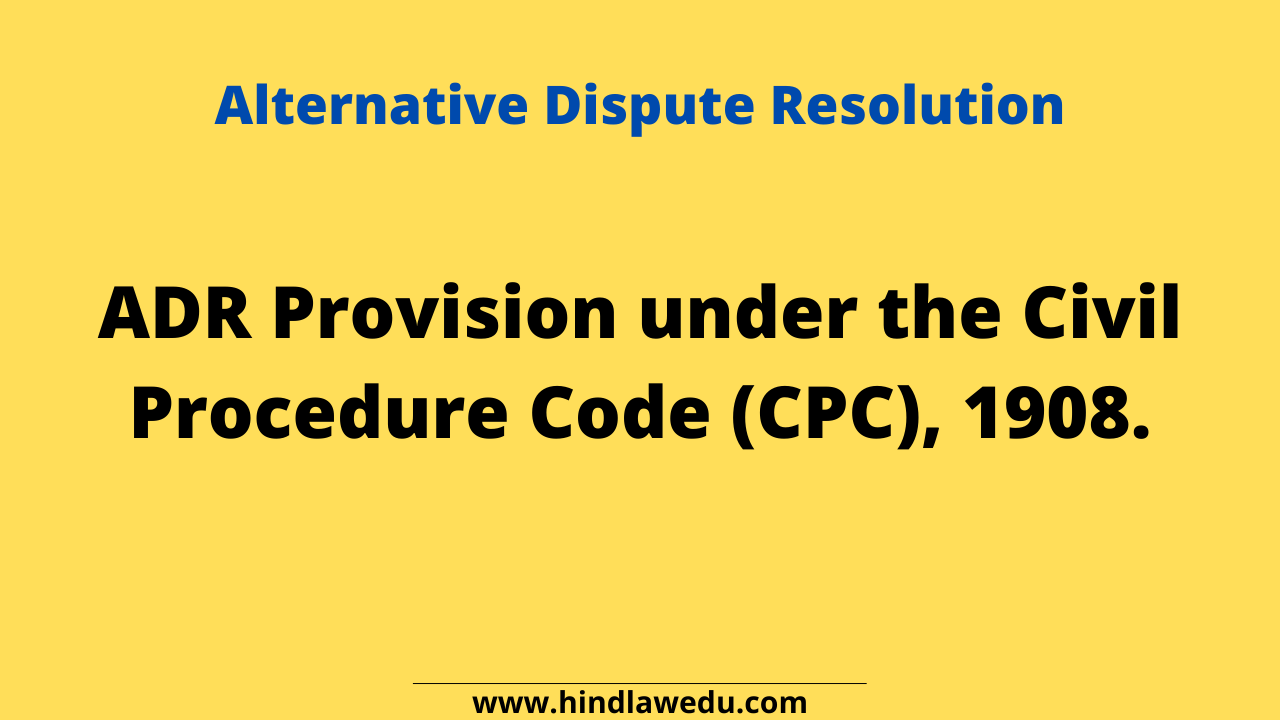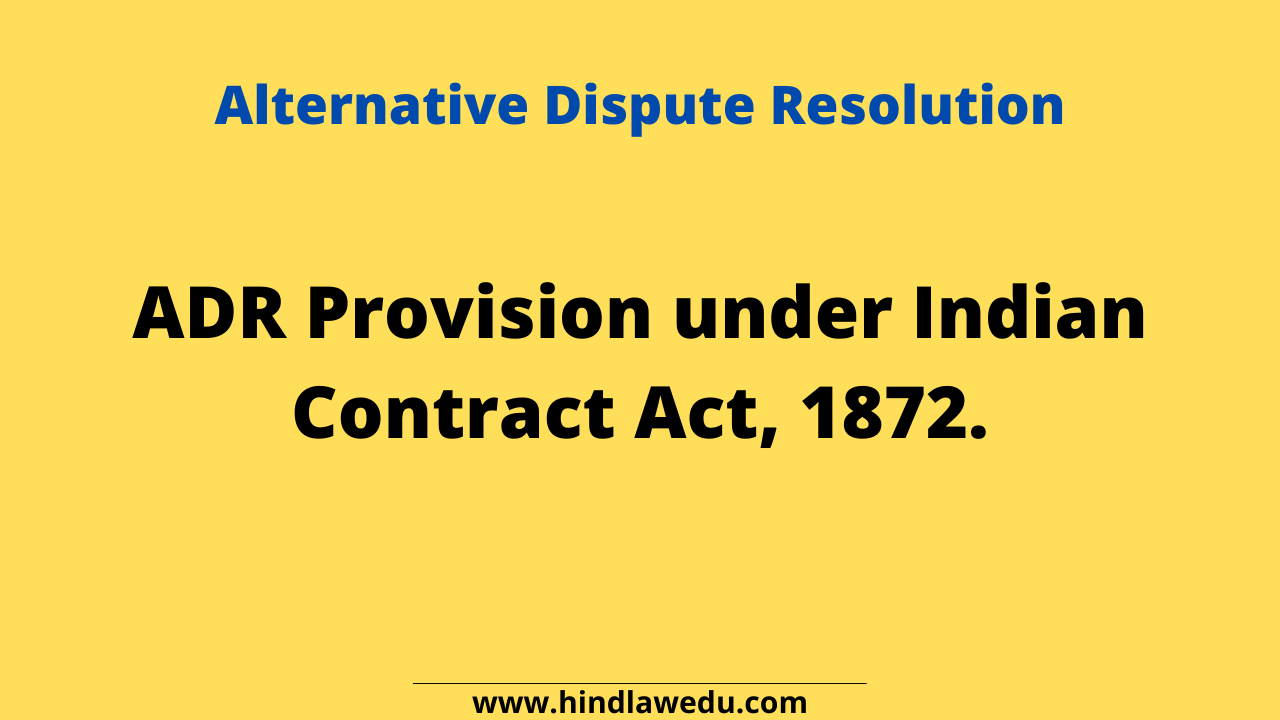Table of Contents
Meaning
When a matter of dispute is tried to be solved by persuading(राजी) the parties to reach a compromise through the medium of a conciliator, the dispute is said to be solved by the conciliation proceedings and are quite distinct from arbitral proceedings, which may be in judicial or non judicial form. In conciliation, there is no need for any agreement for conciliation as it is required in arbitration proceedings where a valid agreement of arbitration is a must.
Conciliation means settling disputes without litigation. It is an informal process in which a conciliator i.e. third party tries to bring the disputants to agreement. He overcomes the disputable issues by lowering the tension, improvement in communication, interpreting issues, providing technical assistance, exploring potential solutions and bringing the negotiated settlement before the parties.
Under the purview of Alternative Dispute Resolution, the conciliation proceedings occupy a very important place. Part III of the Arbitration and Conciliation Act 1996, deals with conciliation. It is a voluntary proceeding where parties in dispute agree to resolve their dispute through conciliation. It is a flexible process which allows the parties to decide the time and place for conciliation, structure, content and terms of negotiations.
The process of conciliation may be equated with the Panchayat System of India were 5 or more people decide a dispute, though in case of conciliation, the conciliator may be one person agreed by both the parties or it may be an institution by which the parties have agreed to resolve their dispute.
The law relating to conciliation has been codified for the first time in India on the pattern of UNCITRAL Conciliation Rules.
Disputes To Be Settled By Conciliation
Any dispute which has arisen or may arise between the parties in respect of the defined legal relationship, whether contractual or not, can be settled by conciliation where the parties agreed to seek an amicable settlement for that dispute by conciliation, except where a particular mode of settlement is prescribed by or under the law.
How And When Parties Can Take Recourse To Conciliation –
- By entering into an agreement for seeking an amicable settlement of the dispute by conciliation. The agreement can be entered into before a dispute has arisen. It can be an independent agreement, or, in case of contractual dispute, in the form of the clause of the contract. It can also be entered after a dispute has arisen;
- Even when there is no agreement between the parties to amicable settlement of the disputes between them by conciliation, a party desiring conciliation may send to the other party a written invitation to conciliate. Recourse to settlement can be taken if the other party accepts the invitation to conciliate. Conciliation would not take place if the other party rejects the invitation.
Conciliator
A conciliator is described as a person persuading parties to reach an agreement. Normally, there is one conciliator but the parties have the freedom to agree that there should be two or three conciliators.
Appointment Of Conciliators
The parties may follow any of the following courses:
- The parties themselves may name a conciliator or conciliators; OR
- Each party may appoint one conciliator and may mutually agree on the third conciliator; OR
- The parties may take the assistance of a suitable institution in connection with the appointment of conciliators.
Role Of Conciliator
- Independent And Impartiality: The conciliator assists the parties in an independent and impartial manner in their attempt to reach an amicable settlement of their dispute.
- Fairness And Justice: He is guided by the principles of objectivity, fairness and justice, giving consideration to, among other things, the rights and objections of the parties, the usage(practices) of the trade concerned and the circumstances surrounding the dispute, including any previous business practices between the parties.
- Communication Between The Conciliators And Parties: The conciliator may invite the parties to meet him or may communicate with them orally or in writing. He may do so with the parties together or with each of them separately.
- Place Of Meeting: The parties have freedom to fix by their agreement the place where the meetings with the conciliator are to be held. Where there is no such agreement, the place of meeting will be fixed by the conciliator after consultation with the parties. In doing so the circumstances of the conciliation proceedings will have to be considered.
- Disclosure Of Information: When the conciliator receives information about any fact relating to the disputes from a party, he should disclose the substance of that information to the other party. The purpose of this provision is to enable the other party to present an explanation which he might consider appropriate.
- Confidentiality: The conciliator and the parties keep confidential all matters relating to conciliation proceedings. They may treat the settlement agreement also confidential except where its disclosure is necessary for the purpose of implementation and enforcement.
- Corporation Of Parties With Conciliator: The parties should in good faith cooperate with the conciliator. They should submit the written materials, provide evidence and attend meetings when the conciliator requests them for this purpose.
The parties may initiate conciliation even during the pendency of any court or arbitration proceedings involving the same dispute, without prejudice(bias) to their respective stands in those proceedings. If such conciliation succeeds they report to the court or the arbitral tribunal, as the case may be, who may pass a decree or arbitral award in terms of such settlement.
When No Agreement Is Reached Between Parties
In conciliation the parties are free to withdraw at any stage of the proceedings. The conciliator is also free to terminate the proceedings if he finds that there is no scope for settlement. The parties are free to mutually agree to settlement of some disputes or part of the disputes leaving the remaining disputes or part of the dispute to be resolved by other modes of settlement. Thus, even where an attempt to conciliate fails, it helps in narrowing the issues in dispute.
Advantages Of Resolution Of A Dispute By Conciliation
Conciliation is becoming increasingly popular, as an alternative to other formal and informal modes of dispute resolution due to its obvious advantages:
- It offers a more flexible alternative, for a wide variety of disputes, small as well as large;
- It obviates(keeps away) the parties from seeking recourse to the court system.
- It reserves the freedom of the parties to withdraw from conciliation without prejudice to their legal position inter se at any stage of the proceedings;
- It is committed to maintenance of confidentiality throughout the proceedings and thereafter, of the dispute, the information exchanged, the offers and counter offers of solutions made and the settlement arrived at;
- It is cost effective and helps in resolving dispute quickly;
- There is no scope for bias in conciliation.
Conclusion
It can be seen that dispute resolution by conciliation is a better alternative to the formal justice system and even to arbitration and other ADR procedures.
However, the success of the conciliation process depends on the mental attitude of the parties, the skill of the conciliator and the proper environment, backed by infrastructure facilities for serving the conciliation procedures.
ADR institutions are best suited for conducting conciliation proceedings. it can provide the proper environment and also the other services needed by the conciliator and the parties for successful completion of the conciliation proceedings.
In India, the ICADR (THE INTERNATIONAL CENTRE FOR ALTERNATIVE DISPUTE RESOLUTION) is the first and a unique institution which provides a complete regime of ADR procedures and requisites administrative services needed for those procedures including arbitration and conciliation, both domestic and international. Its rules of conciliation, structural on UNCITRAL Conciliation Rules, are of universal familiarity and recognition and can be of great help in proceedings with conciliation in a professional and organized manner.
Also Read:
- Article 51 and 253: Government of India’s Obligation
- Arbitration: Meaning, History, Kinds and Advantages
- ADR: Meaning, History, Types, Nature And Concept
- ADR System: Advantages And Disadvantages













